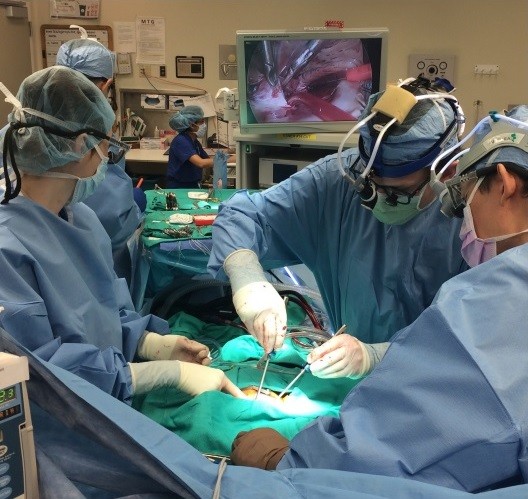Heart surgery, often known as Cardiovascular surgery, refers to any surgical treatment involving the heart or the blood arteries that transport blood to and from the heart. Patients with cardiac disease, who have had a stroke, heart attack, or blood clot, and those at high risk of developing these disorders, are common candidates for these operations.
While cardiovascular surgery is not always required to treat heart problems, doctors may advise it for various reasons, such as avoiding heart attacks and blood clots, addressing irregular heartbeats, repairing congenital heart issues, and replacing damaged or diseased heart valves. In addition, some heart blockage treatments with surgery, although many are addressed with minimally invasive procedures such as catheters and robots.
Connect to the best hospital for heart surgery in Hyderabad for a healthy and happy heart. Further, let us read about different heart conditions where heart surgery is the recommended treatment.
Heart Failure
Heart failure arises when your heart cannot pump sufficient oxygen-rich blood to meet your body’s requirements. Heart failure does not indicate that your heart has ceased or is soon to cease beating. However, if your organs do not get adequate blood flow, they may not function properly, leading to major complications.
Heart failure can occur on one side of the heart or both sides of the heart:
Right-sided heart failure – Your heart is too weak to pump adequate amount of blood to your lungs to acquire enough oxygen when you have right-sided heart failure.
Left-sided heart failure- your heart cannot pump sufficient oxygen-rich blood to your body. This occurs when the left side of your heart either:
- Too exhausted to pump enough blood.
- Too thick or rigid to relax and fill enough with blood.
What does heart surgery do?
Inserting a device into the chest that may include:
- A cardioverter defibrillator (ICD) is an implanted device to help avoid sudden cardiac arrest.
- A biventricular pacemaker to better synchronize the heart’s pumping function.
- A ventricular assist device that assists the heart in pumping blood.
- A complete artificial heart is designed to pump blood to the heart.
- Replaces a severely sick heart with a healthy heart (heart transplantation).
Heart Valve Disease
Heart valve disease arises when one valve or more heart valves fail to function properly.
Heart valve diseases can result from two sorts of issues:
- Regurgitation (leakage of the valve)- When the valve does not fully close, blood flows backward through the valve. This lowers forward blood flow and can result in cardiac volume overload.
- Stenosis (narrowing of the valve)- When the aperture of the valve(s) narrows, blood flow out of the ventricles or atria is restricted. The heart must pump greater force to transport blood through the constricted or stiff (stenotic) valve.
Heart valves can suffer from both reflux and stenosis. Furthermore, multiple cardiac valves can be damaged at the same time. When heart valves fail to close and open properly, the consequences for the heart can be severe, potentially impairing the heart’s ability to pump enough blood throughout the body. One cause of heart failure is an issue with the heart valves.
What does heart surgery do?
- Heart valves are repaired.
- Heart valves are replaced by mechanical or biological valves manufactured from pigs, cows, or human heart tissue.
Arrhythmias
Arrhythmias are irregular heartbeats. Arrhythmia is defined as any deviation from the regular sequence of electrical impulses.
Some arrhythmias are so brief (such as a temporary halt or premature beat) that they have little effect on the overall heart rate or rhythm. However, if arrhythmias persist, they may cause the heart rate to become too slow, too rapid, or unpredictable, causing the heart to pump less effectively.
- Tachycardia is a rapid heart rate (generating more than 100 beats per minute in adults).
- Bradycardia is a sluggish heart rate ( generating less than 60 beats per minute).
What does heart surgery do?
- A pacemaker to correct your heartbeat.
- An implantable cardioverter defibrillator (ICD) is implanted in your chest.
Coronary Artery Disease
Coronary artery disease (CAD) occurs when the arteries that deliver blood to the heart muscle stiffen and constrict. This is due to the accumulation of cholesterol and other debris on their inner walls, known as plaque. This accumulation is known as atherosclerosis. As it expands, it restricts blood flow through the arteries. As a result, the heart muscle is deprived of blood and oxygen. This can result in angina or a heart attack.
What does heart surgery do?
Surgical treatment of coronary artery disease creates a new route for blood to flow around a blocked artery in the heart. This procedure is known as a coronary artery bypass graft (CABG) or heart bypass.
Here are a few more health conditions where heart surgery can be the definitive treatment.
- Amyloidosis- A disease characterized by an abnormal accumulation of proteins (called amyloids) in several organs.
- Aortic dissection- Aneurysms, tears in the inner lining, and penetrating ulcers are all examples of aortic disorders (the major artery that feeds blood from the heart).
- Congenital heart disease- A congenital disability by birth in the structure of the heart and related arteries.
- Hypertrophic cardiomyopathy- In the absence of an apparent reason, a hereditary disorder in which the heart muscle is massive. When the muscle of the heart’s left ventricle becomes thicker than normal, blood circulation to the rest of the body is impeded.
Final Words
Heart surgery is performed to deal with heart problems. Your doctor may prescribe heart surgery when lifestyle modifications, medications, or other procedures no longer work. Only in an emergency case cardiac surgery may be performed. Every year, about 2 million people worldwide undergo open-heart surgery to treat various heart diseases.
Connect to the best cardiology hospital in Hyderabad regarding heart-related problems because a healthy heart is a happy life.



